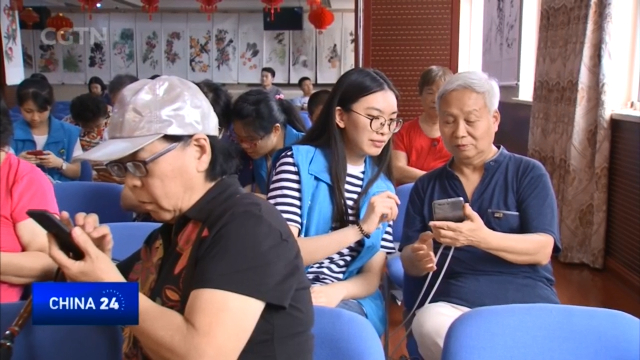
21:45, 09-Sep-2018
My Aging Parents: Elderly Chinese take on hi-tech lifestyle
Updated
21:05, 12-Sep-2018
03:37

More than 700 million people across China use the Internet, with about ten percent of them above the age of 50. For that group, the internet is a source of information and medium of communication that's far removed from anything they had growing up. But while many of the over-50's are coping very well with the intense change of pace, others are finding the going a little tough. David Deen has more.
"I want to keep pace with the times."
"I am interested in new things. I think if young people can handle it, so can we."
Perhaps, this is why many elderly are now attending courses which help them master the essential skills of the digital age.
See Young, a social service organization in Beijing, specializes in helping them get the most out of their smartphones, showing them simple things like how to take pictures, but also more essential services such as online shopping and making a doctor's appointment.
Its co-founder, Luo Xu said many of his elderly relatives were frustrated by being left behind in the new technological age, so he and his friends established this free training program, which aims to, just as Luo says, "to help the elderly cross the digital divide".
LUO XU CO-FOUNDER, SEE YOUNG "It brings us lots of convenience with a mobile phone in hand whenever we eat out, hail a taxi, make an online hospital appointment or even book a hotel. But the older generations find it difficult to get the most out of those conveniences because some of them are not that familiar with mobile phones. On the other hand, the internet and hi-tech can help them better understand the outside world."
Luo said they were initially unsure as to how popular the course would be and he admits it did take a little time to catch on. But in the end, the so-called "elderly students" realised the benefits of catching up.
SUI MINGZHE COURSE INSTRUCTOR, SEE YOUNG "We employ various measures as special textbooks, jingles and simple analogies, to help them learn how to use mobile functions and the internet."
LUO XU CO-FOUNDER, SEE YOUNG "We also upload some of our courses on our website, so they can watch and learn them repetitively and share them with their friends."
There are about 80 million Internet users in China over the age of 50. Chatting, reading news, listening to music and watching soap operas are some of the activities they enjoy the most. More than a third say they spend over three hours on the internet every day; whilst about ten percent are online for about six hours. They say their biggest problems lie with the various input methods and functions on mobile apps.
XIE ZENGYI, PROFESSOR OF LABOR AND SOCIAL LAW CHINESE ACADEMY OF SOCIAL SCIENCES "Traditional media sources are still major platforms for the elderly to get information. So these platforms should provide more information especially for them. We should also expand these information channels and strengthen the elderly's capability to absorb the information. To do so, more training is needed for seniors. Laws also specify their legal rights and interests to education."
There are elements of the Internet which are obviously too complicated for the elderly to understand. But at least there are now opportunities to help them enjoy its basic functions.
"I have just learned how to use Wechat."
"I would definitely participate in training like this."
David Deen, CGTN, BEIJING.

SITEMAP
Copyright © 2018 CGTN. Beijing ICP prepared NO.16065310-3
Copyright © 2018 CGTN. Beijing ICP prepared NO.16065310-3